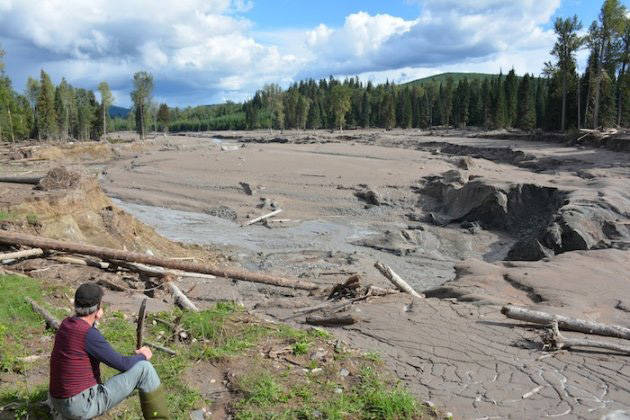As an Alaskan who deeply loves my state, I am most alarmed by the Draft Environmental Impact Statement for Pebble Mine issued by the U.S. Army Corps of Engineers.
The Army Corps has clearly been compromised. They fail to take seriously the most looming threat from Pebble — a catastrophic tailings dam failure like the tragedy at Mount Polley in 2014. This dam failure resulted in a slurry of toxic water and millions of cubic meters of silt into pristine Quesnel Lake. Until then, Quesnel Lake had been the cleanest deep water lake in the world.
Salmon were caught with their skin disintegrating. Can you imagine the outrage if that happened in Alaska?
[Opinion: Defend Pebble Mine review on its merits instead of blaming critics]
Knight Piésold, the company responsible for designing the dam that failed, is the same company hired by Northern Dynasty to design the earthen dams at Pebble. How can we possibly entrust our children’s most precious earthly resources, like the world-class Bristol Bay salmon run, to the likes of them?
Even if we were lucky enough to avoid a catastrophic dam failure into the pristine salmon-bearing waters of Bristol Bay, the threat remains of slowly leaking mine waste for many, many generations long after Northern Dynasty has gone bankrupt and ceased to exist. It would fall to future taxpayers to clean up the mess, and that is unacceptable.
It is likewise unacceptable to drill for fossil fuels in the Arctic National Wildlife Refuge. It is presently our obligation to sit tight on such fuel reserves. Future generations will surely need access to these energy stores so they may build the infrastructure to transition to clean and sustainable energy sources. This is the only remaining wise use for these reserves.
[Opinion: As farming takes root in Southeast, cuts to agriculture are worrisome]
Finally, Alaskans are proud to protect the largest remaining national forest, the Tongass. We recognize the forest as a precious resource that keeps our ecosystem healthy, contributes to a stable local economy through fishing, tourism, recreation and science, and provides mental and physical well-being to Southeast Alaskans, as well as over 1 million tourists a year.
We recognize the Tongass as ancient and sacred; its beauty and wildness are balm to the weary soul. In its cool, moist air, one dwells within the lungs of the living planet. Our planet depends on forests to inhale and store carbon. Intact old-growth forests such as the Tongass are a vital part of the global atmospheric carbon cycle, and stabilize the climate by sequestering vast amounts of carbon dioxide.
[Opinion: Roadless Rule and the Tongass should remain intact]
Contrary to the misinformation campaign regarding the Roadless Rule, the rule does allow some roads to be approved that deal with transmission lines, mining and hydropower. What we intend to block is industrial-scale logging. Alaskans are proud that the Roadless Rule is a model for the rest of the nation and intend to keep it intact.
What will our descendants make of this mad rush to exploit all the world’s resources within a few generations, leaving degraded food supplies and a climate gone haywire? We can’t help but see ahead to the appalling situation we are creating for them with our industrial-scale resource extraction. I envision them cursing us for letting the destruction of the global ecosystem happen on our watch and for not being brave enough to stop the bullies.
The overriding importance of maintaining a stable global climate and sustainable food systems demands that we guard and protect our state’s precious resources. The world is counting on us.
• Natalie Watson is the board vice president of the Southeast Alaska Conservation Council. My Turns and Letters to the Editor represent the view of the author, not the view of the Juneau Empire.

